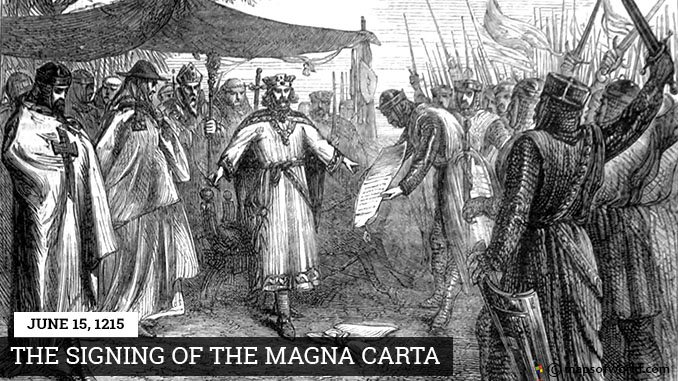For generations, the rule of law in England was a disorganized mess. Subject to local tradition far more than national statute, subjects within the kingdom were often tried in cruel and unusual ways based on the whims of the particular landowner on whose property the crime was committed. As late as the 12th century, a “trial” could be conducted “by immersing a bandaged hand into boiling water for some minutes.” In order to combat abuses by the monarchy and set up a uniform code, British nobles forced King John to guarantee a common set of rights while agreeing to limits on his own power on June 15, 1215. Considered the grandfather of constitutional documents the world over despite itself being inspired by the Charter of Liberties issued by Henry I (1100), the benefits of the Magna Carta were largely restricted to the wealthy at the time it was signed. The king could no longer inflict harsher punishments on one baron than another, nor could he simply declare someone had committed a crime for the sake of amassing valuable property for himself. (Contrary to popular belief, the rights of the average person were not elevated in any real way.) For the sake of practical usage, the document is more important as a milestone in the evolution of democracy protected by constitutions – kings would continue to flaunt absolute power in the faces of their countrymen for hundreds of years. During the English Civil War, the Magna Carta became the signature exhibit in the court of public opinion for the subjection of the royal family to common law. Much of what was included in the first iteration (and the more solid update made in 1297) has now been repealed – only the freedom of the English Church, “ancient liberties” of London and the right to due process remain. During the revolutionary periods of the 1600s and 1700s, the Magna Carta took on the crucial importance it is known for today: inspiration. The Constitution of the United States of America, in particular, gained its place as the ultimate code of law for the new nation thanks to the example of the Magna Carta – judicial decisions from the Supreme Court have referred to it as recently as 1967. (Klopfer v. North Carolina, a case regarding the right to a speedy trial.) Though the original Magna Carta documents – there are at least three distinct versions – are essentially obsolete, they represent the fomentation of an idea that has spread throughout the world and followed with varying levels of success: everyone is subject to the rule of law, regardless of status. Much of the former British Empire has instituted similar protections for its citizens, including countries on all six inhabited continents.
June 15, 1215 – The Signing of the Magna Carta
For generations, the rule of law in England was a disorganized mess. Subject to local tradition far more than national statute, subjects within the kingdom were often tried in cruel…
319
